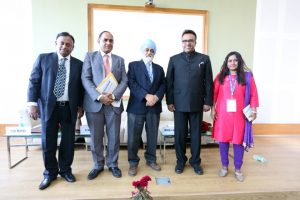New Delhi, 27th March 2019: With global warming taking its toll, pollution levels reaching a terrifying level and infrastructural development of city life harming the nature and ecosystem at length, its high time to save the environment for human’s own good. But to achieve that, the foremost necessity is to sensitize and educate the society about the causes and effects of environmental damage and climate change due to it. Only then it would be possible to combat the threats and come up with solutions through environmental law and justice. And this is what Jindal Global University (JGU) attempted as they hosted a conference on Adapting Environmental Laws for Effective Climate Response today, in association with World Wildlife Fund India.
The day-long conference discussed the threats faced by the environment and climate and their consequences, the role of law to get things straight and achieve environmental justice as well as the steps that need to be mandated to reach that point. The sessions graced by eminent Judges and academic people perfectly set the context and elaborated on the situation that needs to be changed on priority basis.
In his welcome address, Ravi Singh, Secretary General & Chief Executive Officer, WWF-India explained the role of law in creating a healthy and clean environment around and thereby preventing the abrupt changes in climate. “The abrupt changes in climate these days are alarming. These changes and protection of environment comes under the purview of law and policies. Aiming to create awareness about this and its implications, Green Law lecture was initiated in 1998 to promote environmental law. Now law institutions and global law schools are taking this ahead.”
Moulika Arabhi, Advisor, Centre for Environmental Law, WWF India feels, “Law and policies of the country need to be stringent to combat climate change and its adverse effects. Economic development, decentralized Government mechanisms and judiciary collaboration need to go hand in hand to deal with climate change issues and adaptation to them through policies implementation. Environment law courses and conferences like this provide the necessary understanding.”
According to Hon’ble Justice Swatanter Kumar, Former Chair Person, National Green Tribunal and Former Judge, Supreme Court of India, “We want to imagine Delhi has good air, clean water, no carbon emission, no traffic mess and that children don’t have to wear masks anymore. Because one of the best known principle is, you give earth to your next generation, if not better, then in its existing good condition. At the current state, we need to work out to protect our environment. Expansion of article 21 says, right to live implies right to a clean environment. Depreciation and disruption of environment is not seen, but felt. Hence, there should be sensitization of everybody regarding this. Because without the consciousness, environmental justice and its implementation can’t be achieved.”
He further pinpointed that, “Our sense of development work, constructions and infrastructure building implies deforestation, carbon emission, reducing glaciers and ship sinking and that’s a scary tale. But no one contributes in battling them as everyone expects others will do it. And if we don’t fulfil the basic conditions, saving the environment would be a tough task. Climate change is a direct consequence of human activities. For example, 75000 hectares of waste is created every day in the city that contributes in pollution, a mountain gets wiped of greens to set up a hotel. And precisely, these are the things that lead to abrupt climatic changes. Increase of temperature for example will lead to further problems only. So to change the picture not only judges and law practitioners have to be sensitized, but there should an overall consciousness. Matters like carbon neutrality and carbon footprints should be taken into consideration as people needs to understand the gravity of the problem by balancing the advantages and disadvantages.
In this scenario, focus is needed on core issues to find solutions that won’t create another problem to be solved by someone else. But this kind of conferences and courses are still the rays of hope- that there is time to right our wrongs, to make a difference though time is short.”
In her speech, Dr. Sejal Worah, Programme Director, WWF-India pointed out how India is becoming worse hit by the unusual climatic disorders and the consequent impact on GDP. “We can see how the climate is changing every day and if this continues, it will have a huge impact in biodiversity. We thus need to secure our future and that of the coming generations. Moreover, this scenario is leading to higher costs incurred to adapt to the sudden changes. Who is going to pay for them?”
Hon’ble Justice Michael D. Wilson, Judge of Supreme Court of Hawaii, USA cites example of the climate refugees to explain how the issue of environment protection is still awaiting solution. “160 million Bangladeshis have become climate refugees and had to evacuate their own home-ground. Schools stay shut in Delhi in times of extreme pollution. Tigers face threats of deforestation and climate changes. These are few examples of the situation. To change it, carbon neutrality, energy conservation and environment protection need to be mandated.” He says.
Hon’ble Justice Sabrina McKenna, Judges of Supreme Court of Hawaii, USA too brings up case studies to explain the alarming scenario. But she sounds hopeful saying, “Green tribunal has been a milestone in environmental justice. People can now sue for a clean and happy environment. When people are aware, active and act together and laws are there too, combating climate changes will be easier.
Professor Dabiru Sridhar Patnaik, Proctor, JGU, and Director, Centre for Post Graduate Legal Studies, Jindal Global Law School concluded the conference saying, “The most important part is that, we all know we need to save the environment. But the question that remains is, how to do it. We need to find solutions collectively. Environment is a common and public good, that needs to be saved.”
Through-out the day, there were also thematic sessions discussing legal and policy measures to promote energy efficiency and renewable resources and the methods to strengthen adaptation and resilience to climate change.


